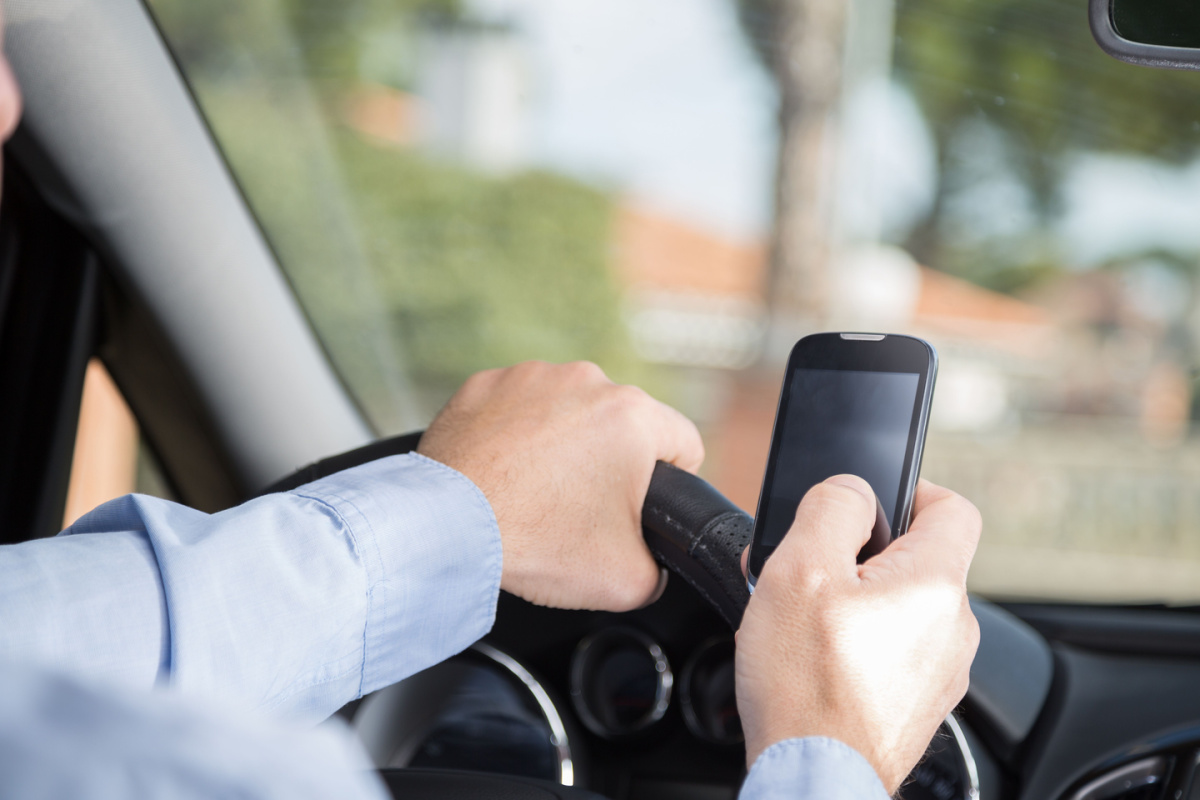
Partner at AKD Lawyers
Practice Areas: Personal Injury

Distracted driving is one of the leading causes of car accidents in the U.S., and Louisiana is no exception. Every year, thousands of lives are lost due to preventable crashes caused by drivers who take their eyes, hands, or minds off the road.
Many people assume distracted driving is limited to texting while driving, but it includes a variety of activities—from eating and drinking to adjusting the radio or talking to passengers. Any activity that diverts attention from driving can lead to severe accidents, legal consequences, and financial liabilities.
This guide will break down the different types of distracted driving, the legal consequences in Louisiana, how fault is determined, and what victims can do to seek compensation. Whether you’re a driver wanting to understand the risks or someone affected by a distracted driving accident, this post will help you navigate the complexities of Louisiana’s laws.
What Is Distracted Driving?
Distracted driving occurs when a driver engages in any activity that takes their attention away from operating their vehicle. Distractions can be classified into three main categories:
- Manual distractions: Actions that cause the driver to remove their hands from the wheel. Examples include texting, eating, drinking, reaching for objects, or adjusting the car’s controls.
- Visual distractions are activities that cause the driver to look away from the road. These include reading a text, looking at a GPS, or turning to talk to passengers.
- Cognitive distractions are situations in which the driver’s mind is not entirely focused on driving. These can be caused by daydreaming, talking on the phone (even hands-free), or dealing with emotional stress.
The most dangerous distractions often involve all three types. For example, texting while driving requires the driver to take their hands off the wheel, their eyes off the road, and their mind off driving—making it a triple threat.
“Texting while driving increases the risk of a crash by 23 times.” – National Highway Traffic Safety Administration (NHTSA)

Texting and Driving: Why It’s a Major Concern
Among all distractions, texting while driving is considered the most dangerous because it combines manual, visual, and cognitive distractions. It significantly increases the risk of accidents, injuries, and fatalities.
A study by the National Safety Council found that at least one out of four accidents in the U.S. is caused by texting while driving. The problem is so widespread that many states, including Louisiana, have passed strict laws prohibiting the use of mobile devices while driving.
“A driver who reads or sends a text while driving at 55 mph takes their eyes off the road for an average of five seconds—enough time to travel the length of a football field.” – National Safety Council
Despite these risks, many drivers still text while driving. The dangers are exceptionally high for young drivers, with studies showing that teenage drivers are the most likely to text and drive.
Distracted Driving Laws in Louisiana
To reduce accidents caused by distractions, Louisiana has strict laws regulating mobile phone use and other forms of distracted driving. The key regulations include:
- Texting Ban: Louisiana prohibits all drivers from sending, reading, or writing text messages while driving.
- Cell Phone Restrictions in School Zones: Drivers cannot use handheld mobile phones in active school zones. Violators face increased fines.
- Learner’s Permit & Intermediate License Restrictions: Drivers with a Class “E” learner’s or intermediate license cannot use a cell phone while driving, even hands-free.
Penalties for Violating Louisiana’s Distracted Driving Laws
- First-time offenders can face fines of up to $500.
- Repeat offenders can be fined up to $1,000 and may face license suspension.
- If texting and driving results in an accident, higher fines and additional penalties may apply.
“Louisiana law prohibits all drivers from texting while operating a vehicle. Violators face fines up to $500 for a first offense and $1,000 for repeat offenses.” – Louisiana Highway Safety Commission.
Legal Consequences of Distracted Driving
Distracted driving is not just a traffic violation—it can also have serious legal consequences. Depending on the accident, a distracted driver may face:
- Traffic violations: Citations, fines, and points added to their driving record.
- Civil liability: If a distracted driver causes an accident, they may be held financially responsible for damages. This includes medical expenses, vehicle repairs, and lost wages for injured victims.
- Personal injury lawsuits: Victims injured by a distracted driver can file lawsuits to recover compensation. Courts may award damages for pain and suffering, emotional distress, and other losses.
In severe cases, distracted drivers may also face criminal charges, especially if their negligence results in serious injuries or fatalities.
Proving Fault in Distracted Driving Accidents
Determining fault in a distracted driving accident is critical when seeking compensation. To establish liability, victims must present substantial evidence showing the at-fault driver was engaged in a distracting activity at the time of the crash. Common types of evidence include:
- Eyewitness testimonies: Passengers, pedestrians, and other drivers can testify if they saw the driver texting or engaging in another distraction.
- Police report: Law enforcement officers record their observations in accident reports, including whether distraction was a factor.
- Traffic camera footage: Videos from traffic cameras or dashcams can capture distracted behavior.
- Cell phone records: Phone logs can prove if the driver was texting or calling during an accident.
- Event Data Recorders (EDRs): These devices, similar to a black box in airplanes, record vehicle speed, braking patterns, and other data that can indicate distracted driving.
“In distracted driving injury cases, proving negligence is critical. Eyewitness accounts, phone records, and dashcam footage can help establish fault.” – Alvendia, Kelly & Demarest Legal Team.
Insurance & Compensation for Victims
Victims of distracted driving accidents have the right to seek compensation for their injuries and losses. Under Louisiana’s comparative negligence law, a victim’s compensation may be reduced if they were partially responsible for the accident.
For example, if a court finds that a victim was 20% at fault and the distracted driver was 80% at fault, the victim’s compensation will be reduced by 20%.
Types of Compensation Available
- Medical Expenses: Covers hospital visits, surgeries, medications, and rehabilitation.
- Lost Wages: Compensates for income lost due to injuries.
- Property Damage: Pays for vehicle repairs or replacement.
- Pain and Suffering: Includes emotional distress, trauma, and reduced quality of life.

FAQs About Distracted Driving Laws in Louisiana
Is it illegal to text and drive in Louisiana?
Yes. Louisiana law bans all texting while driving. Violators face fines of up to $500 for the first offense and up to $1,000 for subsequent violations. Additional penalties apply if texting leads to an accident.
Can I use my phone at a red light?
No. Using a phone is considered a distraction even when the vehicle is stopped at a red light. Louisiana law applies even when the car is temporarily stopped in traffic.
How does distracted driving impact my insurance?
A distracted driving violation can lead to higher insurance premiums. Insurers view distracted driving as high-risk behavior, which may result in increased rates or policy cancellation.
What should I do if I’m injured in a distracted driving accident?
Seek medical attention, file a police report, gather evidence (photos, witness statements), and contact an experienced personal injury lawyer to protect your rights and pursue compensation.
Can I sue a distracted driver who caused my accident?
Yes. If a distracted driver caused your accident, you can file a personal injury lawsuit to recover damages, including medical expenses, lost wages, and pain and suffering.
Conclusion
Distracted driving is a serious and preventable cause of accidents, injuries, and fatalities on Louisiana roads. Whether it’s texting, talking on the phone, eating, or adjusting the radio, any form of distraction puts lives at risk. Louisiana’s strict distracted driving laws are designed to reduce accidents, and violations can lead to hefty fines, legal liability, increased insurance rates, and even personal injury lawsuits.
If you’ve been injured in a distracted driving accident, knowing your legal rights is crucial. You may be entitled to compensation for medical expenses, lost wages, property damage, and pain and suffering. Proving fault in these cases requires strong evidence such as police reports, eyewitness testimony, cell phone records, and dashcam footage.
Navigating the legal process alone can be overwhelming, but you don’t have to do it by yourself. The experienced attorneys at Alvendia, Kelly & Demarest are here to help. We understand the complexities of distracted driving cases and will fight to ensure you receive fair compensation.
Don’t let a distracted driver’s negligence impact your future. Contact Alvendia, Kelly & Demarest today for a free consultation, and let us help you protect your rights and get the justice you deserve.
Categories

In 2003, after being dissatisfied with the quality of legal care for victims of car accidents, Roderick ‘Rico’ Alvendia sought to establish a new firm focused on providing high-quality legal services to aid injured victims and their families. J. Bart Kelly, sharing Rico’s passion for upholding justice, joined the firm later that year, and established a partnership.






